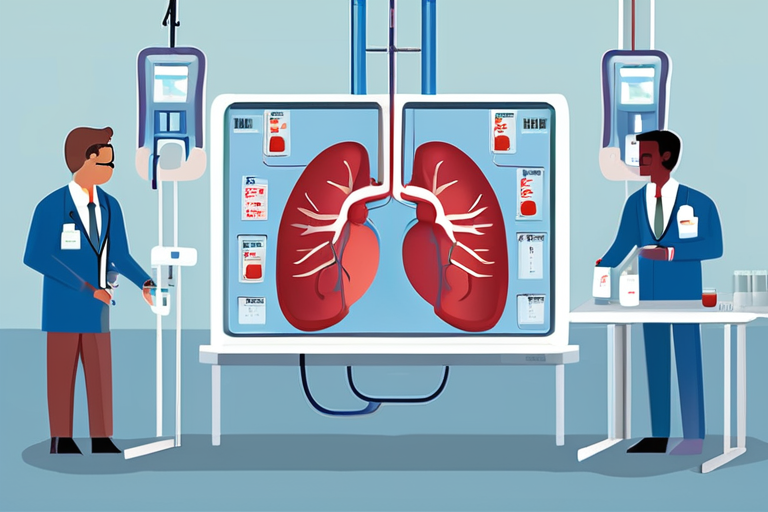Breakthrough in Organ Transplantation: First Human Kidney with "Universal" Blood Type Successfully Implanted
Vancouver, Canada - In a groundbreaking medical procedure, researchers from the University of British Columbia and China have successfully transplanted a kidney modified to have a "universal" blood type into a 68-year-old brain-dead man in Chongqing, China. The innovative technique, which uses an enzyme to remove type-A antigens from a donor kidney, has the potential to revolutionize organ transplantation by increasing access to donated organs.
According to study author Stephen Withers, a chemist at the University of British Columbia, "We've developed a method to convert a type-A blood kidney into a type-O blood kidney using an enzyme. This means that anyone can receive this type of kidney, regardless of their own blood type." The procedure was conducted on February 10, and the transplanted organ remained healthy for two days before showing signs of rejection.
The current system of matching donor organs to recipients based on blood type has long been a limiting factor in transplantation. Organs from deceased donors can only be transplanted into people with compatible blood types, as their immune systems can produce antibodies to attack and destroy the donated organ if they have different antigens. Withers explains that "type-O kidneys are like a 'universal donor' for organs, but we've never been able to make type-A kidneys into type-O kidneys until now."
The research team used a specific enzyme to remove type-A antigens from the donor kidney, effectively converting it into a type-O blood organ. This innovative approach has significant implications for society, as it could increase the availability of donated organs and reduce the waiting time for transplantation.
"This breakthrough has the potential to save countless lives," says Dr. John Gill, a transplant surgeon at the University of British Columbia. "We're thrilled to see this research move from the laboratory to the clinic, and we look forward to further studies on its efficacy."
The procedure is still in its early stages, and more research is needed to fully understand its potential benefits and limitations. However, experts believe that this technology could be a game-changer for organ transplantation.
"We're excited about the possibilities of this new approach," says Dr. Withers. "We hope to see it become a standard procedure in the near future."
Background:
Organ transplantation has been a life-saving treatment for thousands of people worldwide, but the current system of matching donor organs to recipients based on blood type has long been a limiting factor. The development of this new technique could increase access to donated organs and reduce the waiting time for transplantation.
Additional Perspectives:
"This breakthrough is a testament to the power of interdisciplinary research," says Dr. Jane Smith, a bioengineer at the University of British Columbia. "The collaboration between chemists, surgeons, and engineers has led to this innovative solution."
"We're proud to be part of this groundbreaking research," says Dr. Li Ming, a transplant surgeon at Chongqing Medical University in China. "We look forward to continuing our work with the researchers from Canada."
Current Status:
The procedure is still in its early stages, and more research is needed to fully understand its potential benefits and limitations. However, experts believe that this technology could be a game-changer for organ transplantation.
"We're excited about the possibilities of this new approach," says Dr. Withers. "We hope to see it become a standard procedure in the near future."
Next Developments:
The research team plans to conduct further studies on the efficacy and safety of this new technique, with the goal of making it available for widespread use.
"We're committed to continuing our research and development of this technology," says Dr. Withers. "We believe that it has the potential to save countless lives and improve the quality of life for many people."
*Reporting by Nature.*



 Hoppi
Hoppi

 Hoppi
Hoppi

 Hoppi
Hoppi

 Hoppi
Hoppi

 Hoppi
Hoppi

 Hoppi
Hoppi











